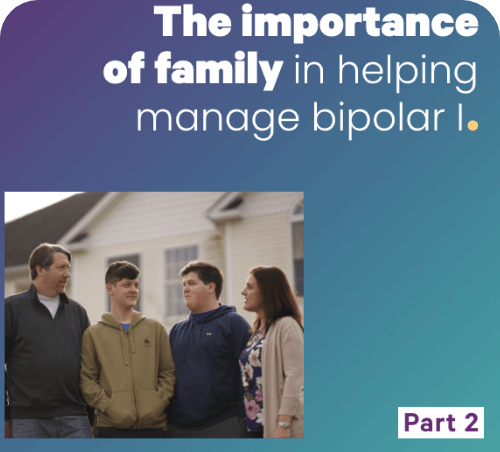VRAYLAR Support &
Resources
Helpful tools for your journey
VRAYLAR effectively treats bipolar I depression and acute manic or mixed episodes of bipolar I in adults, providing full-spectrum relief for all bipolar I symptoms. But controlling the mood swings of bipolar I disorder is about more than medication. Resources that may help optimize your treatment include:

Doctor discussion guide

Patient brochure

Find a healthcare provider
Have you taken any medication(s) for your bipolar I?
Bipolar I stories of strength
Listen to real people with bipolar I disorder share their experiences. Hear more about the signs and symptoms they face during their journey.
The people featured in these videos are sharing their individual experiences with bipolar I. Individual experiences with the condition and treatment will vary. Not all of those featured are currently taking VRAYLAR. These videos are brought to you by AbbVie.
Talk to your healthcare provider to see if VRAYLAR may be right for you.
Alec's bipolar I toolbox (part 1)

Alec shares his treatment journey and the tools that help him manage his bipolar I.
Jacqueline’s relief once she got her bipolar I diagnosis
Jacqueline, a mom, talks through her struggle with the highs and lows of bipolar I.
Dailyn, a spoken word poet, addresses stigma
Dailyn shares her bipolar I experience with a poem.
Understanding possible triggers of bipolar I
Real patients discuss the many possible triggers of bipolar I.
Strategies for everyday living
Get practical coping strategies for living with bipolar I. Managing your bipolar I can be overwhelming at times, but gaining knowledge and support can help you become more comfortable along the way. Listen to psychiatrist Dr. David Scheiderer share tips on maximizing your healthcare provider visits, telemedicine, coping strategies, and more.
Dr. Scheiderer is a healthcare provider and was compensated for his appearance.
This content does not constitute medical advice or establish a patient-physician relationship. Please talk to your healthcare provider about your specific treatment needs.

Find balance with My Mood Matters
My Mood Matters provides support and resources to help you take control.
Sign up for My Mood Matters to get tips, tools, and resources sent right to your inbox. And as a thank you for enrolling, you’ll receive our mobile meditation guide, “Mind Over Mood Swing.”
Peer support groups for bipolar I
Feeling isolated? Know that you are not alone. Connecting with other people who have bipolar I disorder may help you stay on track with your treatment journey and learn new ways to manage your condition.

Support for friends and family
When someone has bipolar I disorder, it affects not only them but the people in their lives. Finding a support network can be helpful for your loved one’s journey. But supporting your friend or family member can demand a lot of empathy and energy from you.
The National Alliance on Mental Illness provides information and support for family and friends that you may find helpful.
Important questions for caregivers to ask
Tip: Take a screenshot of this list to discuss with a healthcare provider.
- How do I help if my friend or loved one has a manic or mixed episode?
- What are some ways I can support my friend or loved one?
- How do I avoid falling into “compassion fatigue” or burning out?
- How do I help if my friend or loved one has a depressive episode?
- Where can I get more help and information on being a good caregiver?
- What are some ways I can take care of myself, too?

Ready to share your VRAYLAR story?
Have you taken VRAYLAR and want to tell your story?
Just call 347-305-1330347-305-1330 or email patientengagement@healthcentral.com
Have you already been prescribed VRAYLAR?
Check out the VRAYLAR Starter Kit for helpful resources to get you started.
Additional resources
Find a healthcare provider
Use this tool to find a healthcare provider in your area and create a reminder for your next appointment.
*Terms and conditions apply. Available to commercially insured patients only. See Terms and Conditions for full details.
























